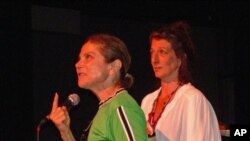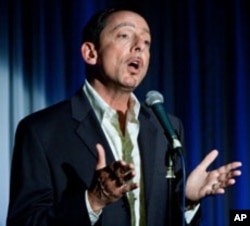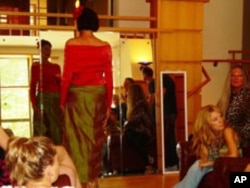The word "cabaret" evokes so many images — singers dressed in sequins and satin, presiding over elegant nightclubs or dark, intimate rooms, cover charges and two-drink minimums.
What is doesn't bring to mind is college dormitories, dining halls and 9 a.m. classes.
But for the past eight summers, aspiring singers have come to New Haven, Connecticut, to attend a sort of cabaret boot camp: the International Cabaret Conference at Yale University.
Intimate connection
New York City club owner Erv Raible has been the conference's executive and artistic director for the past 30 years.
He says cabaret is a deeply emotional medium for a singer. "The intimacy of it, I think, is the most important part. The fact that, unlike any other genre in the entertainment world, you actually go into a room where you go out of there feeling like you know the person. You know something about them. They have touched your heart."
Learning how to effectively touch the heart may be the central goal of the conference but the 38 students also take classes in repertoire, hair, make-up, clothing, sound, lighting and marketing.
Their ages range from 16 to 66, and they come from all over the United States and around the globe.
A second — or third — career
Oklahoma-born Harold Sanditen began his professional life as an investment banker.
"Then I became a theater producer for 20 years in London and I gave that up three years ago to start singing, which is what I wanted to do in the very first place, but I never had the confidence."
At Yale, Sanditen and his fellow classmates have the opportunity to spend nine days working with some of the best music directors and cabaret artists in the business. That includes Laurel Massé, an original member of Manhattan Transfer, and Tony Award-winning actress Faith Prince.
At the first performance session, Sanditen performs his unique take on a Beatles song.
Prince likes it, but sees room for improvement. "I need you to not close your eyes," she tells him. "I feel like you're closing your eyes on the most important contact." He nods, and tries again.
His classmate, Lindsay Sutherland Boal, trained in opera but the Vancouver-based singer recalls she changed her mind, right in the middle of an audition.
Over the course of a week of 14-hour days, the teachers work hard to rid Boal of some of her operatic habits — including a tendency to be overly theatrical.
Singing as story-telling
Boal learned some surprising lessons at the conference.
"It's not important, frankly, to be a singer, to be a cabaret artist. It's all about storytelling and while I, of course, I knew that before, I understand that at a much deeper level now."
Sanditen has learned there are different ways of storytelling, too.
"Songs you think are really serious, you can find comedy in them — you can turn them. You can make something that nobody has ever sung as anything but a serious ballad, you can make it into a comic tour de force."
He demonstrates by turning the soul classic, "Me and Mrs. Jones" — about an extramarital affair between a man and his lover, Mrs. Jones — into a modern, gender-bending ballad involving Mr. Jones, as well.
On the last night of the conference, all the students have three minutes to show what they've learned in front of a paying audience. The concert is called "Cabaret Stars of Tomorrow." Boal performs in a striking red bustier, but with a newfound stillness.
Afterwards, teacher Prince is speechless.
"I think they did incredibly, deliciously wonderful."
And who knows? Maybe some of them will be the cabaret stars of tomorrow.







